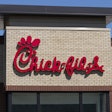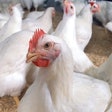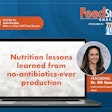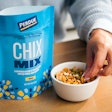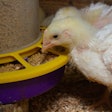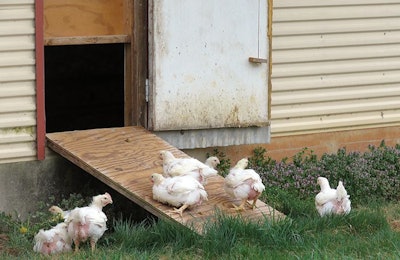
Seven years after starting with a single farm and an idea for a company, Shenandoah Valley Organic LLC is gaining a larger presence in the organic poultry market.
Corwin Heatwole, the CEO of the Harrsionburg, Virginia, company credits the success of the company – founded on his farm as a 300-chicken flock in 2012 – to its scrappiness.

Corwin Heatwole, Shenandoah Valley Organic | Photo by Patty May
The company’s foundations
Shenandoah Valley Organic (SVO) grew out of an idea that there might be a better way to raise poultry than working with an integrator. Heatwole, an eighth-generation poultry farmer with experience raising both turkeys and broilers, saw the pros and cons of the contract growing system and wanted to own his own birds and be in charge of his barns.
Moreover, he saw tremendous growth opportunities in the organic market. Convinced that others would feel the same, Heatwole brainstormed ideas with a group of interested poultry farmers. Out of that came a new business model. Today, SVO works with 48 farmers raising chickens in more than 100 barns around the Shenandoah Valley region of Virginia and aspires to sell its products around the country.
Heatwole believes the success of the company is due to a solid team. He knew it would take time to find the right talent in the right roles to build a solid foundation for controlled and profitable growth.
“The first few years were tough,” Heatwole said. “We changed and grew so rapidly that it caused a lot of shifts. The past 24 months has been a difference of day and night.”
Doing business differently
Under the SVO farmer-focused model, growers own the birds and decide how they are raised. Farms must meet the requirements for the U.S. Department of Agriculture’s certified organic program and Humane Farm Animal Care’s Certified Humane program.
SVO processes only organic chickens. The company buys the chicks and organic feed from Pennsylvania, because Heatwole said SVO did not want the distraction of milling feed and hatching chicks. The company instead wanted to focus only on raising and processing chickens.
Heatwole said SVO is the only poultry company using this model, which allows the farmer to own the chickens until they are brought to the processing plant, and the ownership changes.
The growers' contract with SVO is a cost-plus model. The cost used in calculating the grower's payment is an average cost based on performance of all the growers. Each individual grower is paid the same amount per pound, even knowing what that price will be prior to placing each flock, according to Heatwole.
Since the farmers take more of the risk, they are able to realize a greater profit under this model than the traditional integrator model.
“That’s important to us because the farmer owns it entirely. There is a sense of ownership, a sense of pride that you can’t get in a different model,” Heatwole said. “It allows us to grow faster and grow stronger with a lot less risk because of our partnership with our farmers.”

Shenandoah Valley Organic produces 100% organic birds. Organic growing requires pastures like the one pictured for the birds to roam. | Photo by Patty May
Processing the birds
SVO processes the birds in a rehabilitated poultry processing facility in Harrisonburg. The plant was previously used to process tom turkeys by Golden Acre Farms and Wampler Foods. After Pilgrim’s Pride Corp. acquired the plant, it was sold to private investors who gutted it and used it as office space.
In 2014, SVO purchased the 90,000-square-foot plant with aspirations to process 100% organic birds there.
“(It) was a substantial leap,” Heatwole said. “We had complete faith, no doubt that we could grow into it. Having that unwavering faith and confidence is how we survived and got to this point today.”
In order to bring in volume until the organic sales could reach a certain level to help cover overhead, SVO processed antibiotic-free birds for about two and a half years. By May 2017, the company had transitioned to 100% organic processing.
Today, the plant produces 0.75 million pounds per week of raw product. Birds are currently processed on one evisceration line at 90 birds per minute, with a goal to reach 140 by the end of 2019. At the startup of the processing plant, the company employed 70 full-time employees. It now employs 425.

Corwin Heatwole surveys the flock at Pine Grove Poultry with Elise Cline and Rhett Cline. | Photo by Patty May
Marketing its product
Early on, SVO branded its product as Red Wheelbarrow and Blue Ridge Trail. As it continued to grow, the management team realized it needed a more succinct, meaningful brand. The Farmer Focus brand was introduced in 2015 as the company’s single brand.
Another unique feature of SVO is its authentic farm-to-table aspect. Each product features what SVO calls a farm ID code on its package. Consumers can visit the SVO website, enter the code, and actually see the farm where their chicken comes from. Some people have never even visited a farm. By viewing photos and reading the farmers’ bios, they can appreciate the hard work and dedication of the farmers.
SVO has enjoyed some tremendous visibility over the past few years. It has been showcased by several food bloggers, such as Lexi’s Clean Kitchen, Brooklyn Supper and Table for Two, and it’s partnered with celebrity chef Michael Symon. The company is also working with FreshDirect, an online grocer that delivers to residences and offices in the New York City metropolitan area.
Future aspirations
Currently, SVO does not offer ready-to-eat products. However, this is about to change. Heatwole said it will soon produce value-added products such as sausage, meatball and broth. This will represent SVO’s first entry into the fully cooked, ready-to-eat market. These branded products will include the farm id and be fully traceable, too. Additionally, SVO has about six more products under development today.
Currently, SVO provides product for 2,500 stores mostly east of the Mississippi. Plans are underway to introduce the brand to the West Coast. In fact, the company would like to eventually duplicate its operations on the West Coast.
On the farm side of the equation, there is currently a waiting list of farmers who want to join SVO. If all joined the team, the company would double in size.
“We’re honored and humbled by this waiting list,” Heatwole said. “It means that we’re bringing to the farmer something that is better for them or they wouldn’t want to come on board.”

From left: Elise Cline and her son Rhett Cline grow for Shenandoah Valley Organic. | Photo by Patty May
Shenandoah Valley Organic’s management team
Corwin Heatwole, chief executive officer
Erik Vaughan, president and chief operating officer
Dan Detamore-Hunsberger, vice president, finance, and chief financial officer
Jefferson Heatwole, chief sales and marketing officer
Bob Bahr, vice president, operations
Jack Colemen, vice president, sales and marketing








